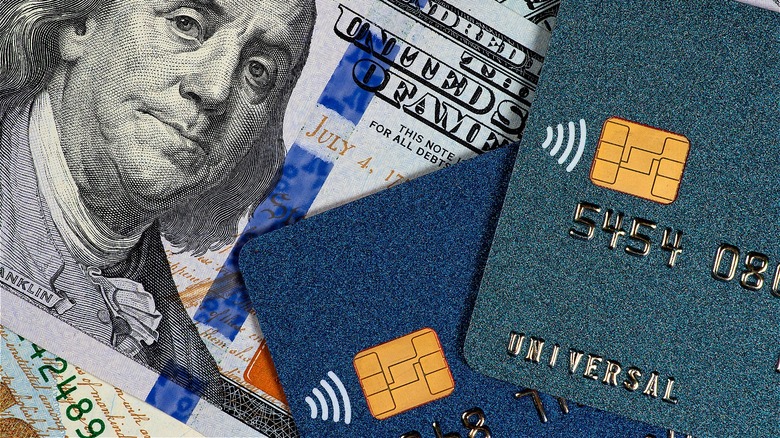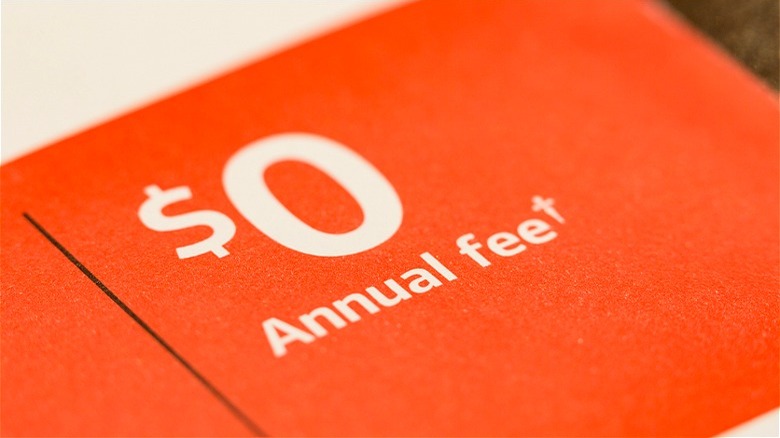Tips For Getting Your Credit Card's Annual Fee Waived
Not long ago, charging cardholders annual fees was a common profit center for credit card issuers. Nowadays, though, credit card companies have little trouble making money from swipe fees and sky -high interest rates, among other things. As a result, it's easy to find credit cards with no annual fee whatsoever today.
That being said, credit cards offering significant perks will typically still charge an annual fee to offset the benefits you're receiving. In the case of travel rewards credit cards, for example, perks can include free checked bags on flights or a one night free hotel stay each year, which for some, easily justifies an annual fee. However, what if you're no longer using a card that charges you a fee each year? Or what if once-valuable perks don't really fit your current lifestyle?
The first step to ditching unwanted credit card fees is to reach out to the card issuer. You'll typically have a grace period of about 30 days to cancel a card after the annual fee has been charged and still receive a refund, but you can certainly contact the card issuer earlier. Credit card providers definitely don't want to lose you as a customer, so they'll typically offer, well, something. In some rare cases, that could be an offer to waive the annual fee. Other alternatives include a bonus for continuing to spend on the card, or transferring your account to a somewhat similar, fee-free version of the same card.
You may need to bluff a little
Often, it can be a poor idea to cancel a credit card outright. Closing an account can hurt your credit score — perhaps significantly, depending on the credit limit and age of the account. For instance, by closing a credit card, you're reducing your overall credit limit and, as a result, your credit utilization ratio will increase. If you've had the account for a long while, closing it will also shorten the overall life of your credit history.
Nonetheless, suggesting to the card issuer that you're prepared to close the account is going to be your bargaining chip. regardless if you will actually make good on that promise. When you call the telephone number on the back of your credit card, either ask to speak to the retention department or explain to the first human available that you are considering canceling the card due to its annual fee. That person can either assist directly or transfer you to the department that can. Note that certain credit card companies may also have an online chat portal available for customer support.
It doesn't hurt to ask, but most card issuers will be unwilling to offer an annual fee waiver, though some exceptions may exist if you've been a long-time cardholder and/or have been spending a lot of money using the card. But in most cases, rather than outright waving the annual fee, it's more likely they'll offer one of two alternatives, which we'll delve into now.
Some issuers will proffer a spending bonus
Instead of outright waiving a credit card's annual fee with no strings attached, it's more likely that a card issuer will offer some kind of conditional waiver or other incentive. For example, you might be presented with the opportunity to spend a certain amount of money on the card in a defined period of time (like $2,000 in three months) in order to receive an annual fee waiver. While this scenario isn't altogether bad, don't be tempted to charge more on your card than you're able to pay off in full each billing cycle and definitely don't make purchases that you otherwise wouldn't have just to receive a "free" annual fee.
Rewards credit cards may offer a similar scheme, but with a twist. You'll still be required to pay the annual fee, but the issuer may offer a large quantity of reward points for meeting a certain spending threshold in a certain time frame. For example, 30,000 bonus points for spending $3,000 within three months. This is similar to the sign-up bonuses that are offered to attract consumers into opening new accounts in the first place, albeit typically not quite as generous. Still, the value of the points can be used to offset the cost of paying the annual fee.
Note, the usual caveats still apply regarding making unnecessary purchases or getting financially overextended just to earn a large bonus. The interest rates on credit card balances regularly exceed 20%, so you definitely don't want to fall into that trap.
Ask about a fee-free version instead
A fairly common solution to not wanting to continue paying an annual fee — yet also not wanting to close a longstanding account — is to switch to an alternate, fee-free credit card from the same issuer. Certain perks associated with the annual-fee card will likely be lost or reduced. If there's a downside to making the move to a more basic, but free, credit card within the same issuer, it's that you won't be eligible for any sign-up bonuses or promotions that may be advertised to attract new customers to that card.
Something else you'll want to consider when preparing to cancel or downgrade your rewards credit card in lieu of paying the annual fee is what'll happen to any unused rewards you've accumulated. In the case of points or travel miles that accrue in an outside environment, like an airline frequent flyer program, those points are likely to be retained — though you might now have a fixed time to redeem them. However, rewards points in the ecosystem of the card issuer, those can be lost if you close the account without first redeeming the points or transferring them.



